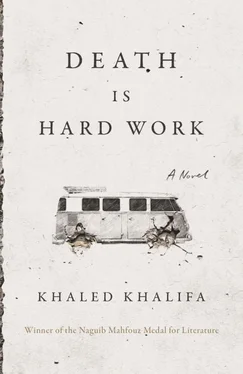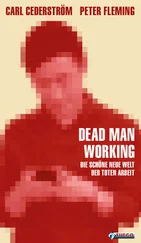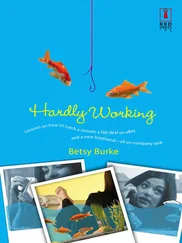It wasn’t the first time he had pictured himself standing in front of his father, speechifying to him, telling him to his face that he was a weak, emasculated man with barely a quarter of a dream to brag of, which wasn’t nearly enough to achieve anything effective. His tirade would conclude: You’re like me, but you wrap your delusions in big words about the liberation of Palestine, which your generation left to rot. Or maybe something about the respectable family Abdel Latif had always wanted, filled with successful, educated, socialist children working in respectable professions: Like all poor people you want your children to become doctors or engineers, but your uniqueness is a fantasy and the cost of it has buried us.
When Bolbol decided to study philosophy, he felt he was disappointing his father. All his life Abdel Latif had venerated the great philosophers who had changed humanity, but for his own children he wanted professions that would safeguard them against going without. But Bolbol felt incapable of doing anything differently. He wanted to understand the world, and tried to be one of the best students, but everything went against him: his teachers despised thought and sold grades and exam answers to the highest bidders; everything that ran most counter to the essence of philosophy existed in abundance in the philosophy department. They despised debate, politics, reflection, and research; the faculty guided students to storefronts where hucksters sold extracts from lectures and where the professors took a commission from every sale. As for the lecturers who tried to reimpose the kind of philosophy that actually provoked reflection, they were either dismissed or finally shut themselves up at home in despair. Student informers wrote reports accusing them of sedition, inciting atheism, and cursing the party as well as Arab nationalism. Thought was a veritable crime, and it necessitated interrogation.
Bolbol soon lost his enthusiasm. He bought lecture notes and followed the teachings of professors who vaunted the ideas and wisdom of the Leader. He didn’t dare admit his cowardice to Lamia. When he was with her, he was possessed by his old image of himself, of which nothing now remained but the remnants of his old, dead ambition. He became one of the herd that only wants a degree to get a job. Soon he was employed at the Institute of Food Storage and Refrigeration, where he recorded the quantities of tomatoes and onions prepared for warehousing and then, at the end of the season, would record how many tons had gone bad. It was trivial work that required no philosophy. Bolbol stopped caring about new ideas, and day by day he became a model employee—scared of everything. What frightened him most were those perilous situations in which he found himself agreeing with Lamia when she spoke of necessary change; she would declare loudly that the populace had reached the last stages of servility and that revolution was the only way of uprooting society’s backwardness, as well as the dictatorship, and bringing to account the murderers who had plundered the country from east to west. Abdel Latif agreed with her enthusiastically, and Bolbol chorused his agreement, too, but deep down his heart was cold like a rotten quince. How it pained him now, the hypocrisy he had shown on so many positions just to satisfy Lamia and retain the privilege of her friendship. If it pleased her, it was enough for him. Even today, the look she had given him that morning as she bid him goodbye was all he’d needed to hoist his father’s body onto his back and carry it through checkpoints, storms, and the arid wilderness.
They were alone on the road again. All other cars disappeared, night fell, and the scene went back to being terrifying. Bolbol felt bleak, Fatima’s face plainly showed her apprehension, and Hussein was worried they were lost. They listened to the storm, and none of them cared about the state of their father’s corpse or whether it fell off the seat. Blueness now suffused the chest almost up to the neck, but they didn’t look at it anymore, so as to avoid seeing the bloating. Hussein had even stopped making proclamations about what time they would arrive. They had traveled more than a hundred kilometers and began to convince themselves they were over halfway there. At this point, they told themselves, mired in the unknown, going on was surely preferable to heading back.
The searchlights of the next checkpoint appeared in the distance. They slowed down. When they reached it, the soldiers on guard looked at the family in astonishment. These soldiers’ outfits were different, nothing like the uniforms at the other checkpoints. These soldiers were also poorer looking than they should have been, as if they had been cut off in this part of the world—they were certainly soldiers, as opposed to Mukhabarat or private militia, but they had been stationed here on the front lines in the full expectation they would die. A soldier of no more than twenty opened the car door and examined the body, aghast. He looked at everyone’s identity cards, smiled, and said he was from a village near Anabiya; he knew the family name. They exhaled in relief and smiled back at him. He took pity on the dead man and, leaning his head into the car, he told the siblings that at the next checkpoint, which belonged to the Free Army, they should find his cousin Hamada. He might help them secure accommodation till morning; they certainly couldn’t keep traveling tonight. Then he raised his hand in farewell and allowed them to pass.
It was fewer than five kilometers to the Free Army’s checkpoint. They asked for Hamada and added the name of his village; Hamada came out, looking surprised, and scrutinized the siblings. They introduced themselves and explained their task to him. He asked them if they knew what it meant to be traveling this road at this time of night. He genuinely wanted to be useful to them and offered to help them find somewhere to stay overnight in a nearby village, at least until dawn, when they could proceed with their journey. The siblings were adamant that they had to reach Anabiya before then; the state of the corpse would brook no delay: they had to bury it as quickly as possible if it wasn’t to disintegrate entirely. Hamada saw from their faces that they were hungry, so he suggested that they join him for dinner. Hussein asked if Hamada would provide them with a written directive to the following checkpoints certifying that he knew them and requesting facilitation of their passage. Hamada laughed and informed them that his influence extended about five meters from the point where they were parked. Every squadron at every checkpoint had its own system, and such a letter would be disastrous if it fell into the hands of hostiles. At that moment, the siblings realized they were truly in unfamiliar territory.
Hussein agreed to drink some tea and wait a little. After all, it would be no use arriving in the middle of the night; they couldn’t very well wake their uncles and cousins and ask them to bury a dead man at midnight. Fatima asked Hamada for some spirits so she could rub down the distended corpse. They drank hot tea, and Hamada supplied them with a small bottle of spirits and some cans of food. He guessed correctly that they were embarrassed to ask anything of people whose appearance so clearly demonstrated their poverty.
Hamada’s face was delicate and gaunt. He told them he had defected from the army a year and a half previously and joined this battalion, which had no funding. He said that his cousin at the previous checkpoint hadn’t wanted to defect, preferring to stay with the regime—and now, even if he wanted to defect, it would be difficult for him to do so, as snipers lay in wait on every road. Hamada finished by saying that his cousin hadn’t visited his family in three years. He said that the two checkpoints were waging a pitched battle for supremacy that was entirely imaginary; they wanted to keep the peace here, but they had been forgotten by everyone else. He would have talked till morning, repeating that the war was a futile bit of madness with no end in sight; it had been a long time since he had seen anyone from his region who would understand how lonely he was. He asked them to look up his father, a good friend of their uncle, when they passed by his village, so they could tell him that Hamada was doing all right. Hamada added that he spoke to his father on the telephone, but a personally delivered message still meant something in that region.
Читать дальше












